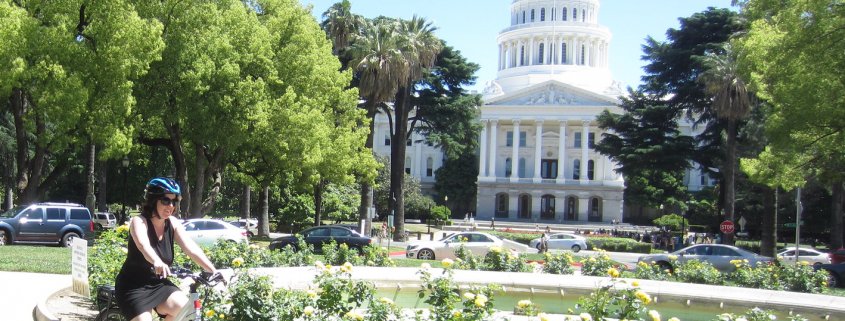CalBike 2019 Legislative Session Wrap-Up
Several victories advance CalBike’s agenda, but a veto forces us to change strategy
While Governor Newsom’s disappointing veto of the Complete Streets Bill got the most attention, CalBike advocated for much more in the 2019 legislative session. CalBike members responded to our calls to action to secure important victories for our mission of making California’s communities more bike-friendly. CalBike succeeded in getting two of its priority bills signed into law: the Bike Turn Lane Bill and the E-Bike Vouchers Bill. These and several other victories marked a fruitful 2019 legislative session for CalBike.
Despite the veto, CalBike’s Complete Streets Campaign scored a success in galvanizing a broad movement for safe streets
More than 80 organizations signed on, with a diverse leadership team that included California Walks, the American Heart Association, AARP, and Safe Routes Partnership. This powerful coalition, backed by thousands of constituents, got the bill past many obstacles in the legislature, including a falsified and inflated cost estimate presented to the Assembly Appropriations Committee. This coalition will stick together to bring unprecedented pressure on Caltrans to meet its stated mission of creating a “safe” transportation system. We will not allow Newsom’s veto to result in continued dangerous conditions for children and older adults and everyone else who chooses to walk, bike, or take transit on state-owned roads in our communities! Our Complete Streets Campaign has simply entered a new phase.
E-bikes included as a clean mobility option
CalBike sponsored SB 400 (Umberg) to make electric bicycles eligible for vouchers in the state’s Clean Cars 4 All program. The program, funded by the California Air Resources Board, provides support for low-income households in the five largest air quality management districts who wish to trade in their old polluting cars for something more affordable than a discounted electric car. E-bikes are much cheaper and have even lower emissions than an electric/hybrid vehicle.
Safer bikeway design mandated
We sponsored AB 1266 (Rivas) to require Caltrans to improve its bikeway design guidance. The Bike-Friendly Turn Lane Bill, signed by the governor on September 4, will result in official approval for designs that encourage people on bicycles to use the left portion of a right-turn lane to go straight, which is often the safest and most appropriate maneuver. This bill is a very important win for cyclists. Intersections are the most dangerous place for bicyclists, where the most injuries and fatalities occur. This law provides a new tool for improving bicycle safety at intersections.
Climate and environmental justice in the next California Transportation Plan
AB 285 (Friedman) requires Caltrans to address how the state will achieve maximum feasible emissions reductions in order to attain a statewide reduction of greenhouse gas emissions. This law also obliges Caltrans to show that the five-year update to the California Transportation Plan it submits in 2020 is consistent with air quality standards. It mandates a forecast of the impacts of advanced and emerging technologies over a 20-year horizon on infrastructure, access, and transportation systems and a review of the progress made implementing past California Transportation Plans. It adds environmental justice as a subject area that the plan is required to consider for the movement of people and freight. Read the full text of the bill in its final form.
Housing and transportation agencies must coordinate
AB 185 (Grayson, Cervantes) requires the Department of Housing and Community Development to participate in joint meetings of the California Air Resources Board and the California Transportation Commission. In joint meetings of the latter two agencies (required thanks to earlier advocacy by CalBike and allies), it became apparent that transportation and air quality goals can’t be easily addressed without also addressing land use. This is an important step toward coordinating our state’s policies to reduce car traffic.
Opening up Amtrak buses to everyone, not just train passengers
Have you ever tried to book an Amtrak bus only to learn that the system won’t allow it unless you also book a train ride for a segment of your trip? For example, Amtrak won’t allow you to book a ticket on the nonstop bus from Los Angeles to Bakersfield, or from Sacramento to Redding, even though they have frequent regular service. SB 742 (Allen) fixes that by authorizing a state or local government to enter into an agreement with Amtrak to provide for the intercity transportation of passengers by motor carrier over regular routes that are open to all riders, including passengers who are not connecting to a passenger rail service.This marks a long-desired change in the rules about Amtrak buses that will make intercity public transit more widely available.
Protecting the Active Transportation Program
SB 152 (Beall) would have changed the allocation of funds from the Active Transportation Program (ATP), which provides funding for bicycle and pedestrian infrastructure projects, including Safe Routes to School. The bill would have granted most of the money directly to regional metropolitan transportation agencies instead of through competitive grants at the state level. This would have threatened the statewide competitive program, which is a model of transparency and equity. CalBike and its partners opposed this bill and helped to defeat it in the Senate.





